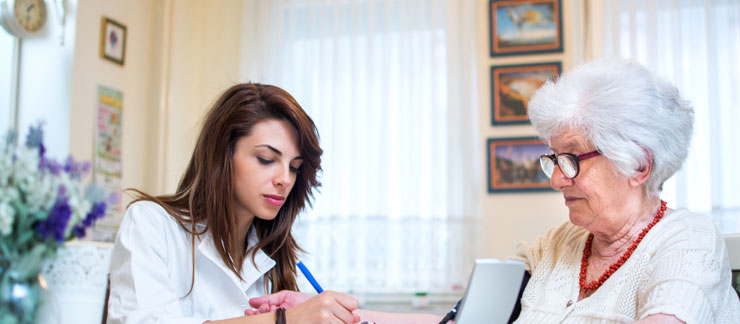
Why Your Senior Loved One Should Get Regular Blood Pressure Checks
Aging leads to natural risks and health changes, and one significant difference is blood pressure. "An increase in blood pressure (BP) has always been taken as an inevitable consequence of aging in industrialized societies, leading to hypertension in a high proportion of elderly subjects,” according to the National Institutes of Health (NIH) article, Blood Pressure and Aging.
Hypertension happens mainly because the blood arteries change and become stiffer. If left untreated, high blood pressure can lead to a stroke or heart attack. About 60 to 80 percent of the elderly face hypertension, “but it is estimated that it will increase with the projected population growth of older people aged more than 65 years,” per the NIH article, Hypertension in the Elderly.
The Need for Regular Blood Pressure Monitoring
Your senior loved one should take regular blood pressure tests. A rise in blood pressure may be a sign of a chronic health issue. For example, high blood pressure may indicate the development of vascular dementia. "In vascular dementia, your brain suffers damage because of a series of small, often unnoticeable silent strokes,” according to HealthinAging.org. “They repeatedly interrupt the flow of blood to your brain. This results in scarring and damage to brain tissue. A blood pressure test can catch health problems before it’s too late.”
Meanwhile, you’re juggling life's ongoing responsibilities. Don’t overburden yourself with a heavy schedule of work, children, family and now full-time care for your elderly loved one. A professional caregiver can monitor blood pressure checks in the comfort of the home. This trained professional will fulfill a desire by the elderly loved one to ‘age in place," and that's essential.
According to a joint report by the Home Care Association of America and Global Coalition on Aging: “Nine out of ten Americans 65 and older want to stay at home for as long as possible, and 80 percent think their current home is where they will always live.”
How Home Care Can Help
A regular blood pressure test can be a part of the personalized monitoring delivered by the professional caregiver. Moreover, if the doctor prescribes blood pressure medication to your elderly loved one, you can rely on the professional caregiver to offer medication reminders. Once the medicine is used, your senior will need more blood pressure tests to find out if the medication is working effectively. You'll be more reassured when a trained professional caregiver focuses on your elderly loved one when you can’t.
Supporting a Healthier Lifestyle
High blood pressure may be a result of a high-salt diet, anxiety and stress. Thankfully, these issues are treatable. If your senior’s doctor makes diet and lifestyle recommendations, your family’s caregiver can carry out tasks to address these sources of high blood pressure.
For example, instead of struggling to make food for your elderly loved one, the professional caregiver can step in. In addition to monitoring blood pressure tests, the professional caregiver can prepare proper meals for the senior. The meals can originate from healthier ingredients. These low-salt ingredients may be purchased during grocery trips accompanied by the professional caregiver. Follow-up blood pressure tests can reveal whether the diet changes helped to lower blood pressure.
The social wellbeing of the elderly can also impact blood pressure. Minimizing loneliness in the elderly is critical to healthier outcomes, according to an NPR article: “Research shows older adults who feel lonely are at greater risk of memory loss, strokes, heart disease and high blood pressure.” Socializing may lower stress and prevent cardiovascular issues.
Companion care can serve as the buffer against social decline. Your elderly loved one will have a friendly companion to hold conversations. Positive interactions during blood pressure checks will make the experience more comfortable for your elderly loved one.
Furthermore, to address high blood pressure, your senior's doctor may recommend exercise. If so, the professional caregiver can supervise safer workouts. For example, going on routine walks may be beneficial for lowering blood pressure in your elderly loved one; however, the senior needs to be protected from falling. As your elderly loved one ages, he or she faces a higher risk of falling. The likelihood of a fall increases with age, up to 37 percent in people 85 years or older, according to the CDC. That makes home care services a wise investment to prevent a fall before it happens. The professional caregiver not only monitors blood pressure checks but also performs tasks to help fight high blood pressure.
On the journey to healthy blood pressure, your elderly loved one can receive compassionate support. A professional caregiver serves as your trusted partner. Should a blood pressure test indicate an issue, you will be promptly notified.
Moreover, by choosing the professional caregiver, you’ll protect the wellbeing of your elderly loved one and potentially lower medical costs. “Elderly American receiving home care generally need fewer trips to doctors and hospitals. As a result, home care reduces overall health care costs…” according to the joint report by the Home Care Association of America and Global Coalition on Aging.
Regular blood pressure checks can help maintain a better quality of life for your senior loved one. Consider home care services to ensure your parent keeps up with his or her blood pressure, and prevent the danger of letting it get too high.
Learn more about creating a care plan with your home care agency by clicking here.


